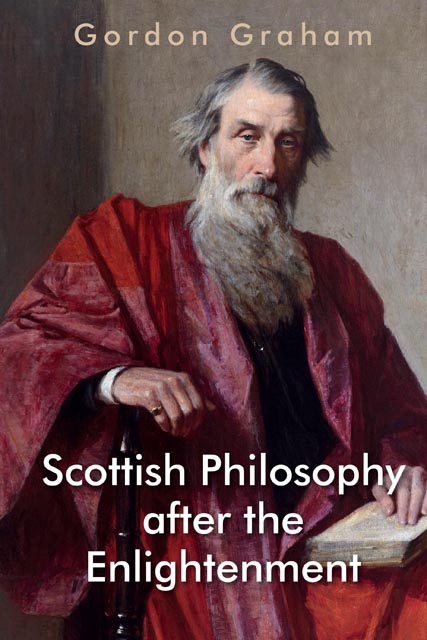Book contents
- Frontmatter
- Contents
- Preface and Acknowledgements
- Series Editor’s Introduction
- A Note on Women in Scottish Philosophy: Mrs Oliphant
- A Chronology of Scottish Philosophy after the Enlightenment
- 1 An Autobiographical Prologue
- 2 Sir William Hamilton and the Revitalisation of Scottish Philosophy
- 3 James Frederick Ferrier and the Course of Scottish Philosophy
- 4 Psychology and Moral Philosophy: Alexander Bain
- 5 Thomas Carlyle and the Philosophy of Rhetoric
- 6 Hegelianism and its Critics
- 7 Scottish Philosophy’s Progress
- 8 Religion, Evolution and Scottish Philosophy
- 9 The Gifford Lectures and the Re-affirmation of Theism: Alexander Campbell Fraser
- 10 The Culmination of Scottish Philosophy: A. S. Pringle-Pattison
- 11 John Macmurray and the Self as Agent
- Bibliography
- Index
1 - An Autobiographical Prologue
Published online by Cambridge University Press: 07 June 2023
- Frontmatter
- Contents
- Preface and Acknowledgements
- Series Editor’s Introduction
- A Note on Women in Scottish Philosophy: Mrs Oliphant
- A Chronology of Scottish Philosophy after the Enlightenment
- 1 An Autobiographical Prologue
- 2 Sir William Hamilton and the Revitalisation of Scottish Philosophy
- 3 James Frederick Ferrier and the Course of Scottish Philosophy
- 4 Psychology and Moral Philosophy: Alexander Bain
- 5 Thomas Carlyle and the Philosophy of Rhetoric
- 6 Hegelianism and its Critics
- 7 Scottish Philosophy’s Progress
- 8 Religion, Evolution and Scottish Philosophy
- 9 The Gifford Lectures and the Re-affirmation of Theism: Alexander Campbell Fraser
- 10 The Culmination of Scottish Philosophy: A. S. Pringle-Pattison
- 11 John Macmurray and the Self as Agent
- Bibliography
- Index
Summary
I
In 1968, at the age of nineteen, I left my native Ireland to become an undergraduate at the University of St Andrews. I knew very little about Scotland, and almost nothing about its universities. I had expected to attend Trinity College Dublin, but circumstances called for a change of plan. I chose St Andrews only because a history teacher I liked was a St Andrews graduate. For this reason, I applied to study History, with English, but discovered when I arrived that admission was to a Faculty, not a subject. This required me to take a year-long course in either ‘Logic and Metaphysics’ or ‘Moral Philosophy’, and the choice had to be made in those few minutes with an ‘Adviser’ that each entering student was allocated. ‘Logic and Metaphysics’ meant absolutely nothing to me. ‘Moral Philosophy’ was almost equally opaque, but I thought I had some understanding of the term ‘moral’, so I chose that. Within six weeks, happily, I had discovered that Moral Philosophy was the perfect subject for me. Consequently, I switched my attention and allegiance, took only one course in History, none at all in English, and in the end went on to devote no less than five decades to studying and teaching philosophy.
At the time, students could not study ‘Philosophy’ at St Andrews. There was no such honours degree, so having discovered this new intellectual enthusiasm, I had to take joint honours – ‘Logic and Metaphysics & Moral Philosophy’. The two halves of this degree proceeded quite independently, with odd consequences occasionally. For instance, I studied Books 2 and 3 of Hume’s Treatise a year before I studied Book 1. The division even found physical expression. Edgecliffe, a matching pair of fine Victorian houses on the Scores overlooking St Andrews Bay, housed two departments with separate entrances and separate classrooms. None of this struck me as strange, since I knew no different, but I was taught almost exclusively by Oxford-trained philosophers to whom, clearly, the division seemed absurd. Accordingly, there were occasional meetings when Bernard Mayo, the Professor of Moral Philosophy, solicited the support of students in his efforts to merge the two subjects and departments into one. Nothing came of this, though such a merger had taken place in Edinburgh some years before.
- Type
- Chapter
- Information
- Scottish Philosophy after the Enlightenment , pp. 1 - 19Publisher: Edinburgh University PressPrint publication year: 2022

